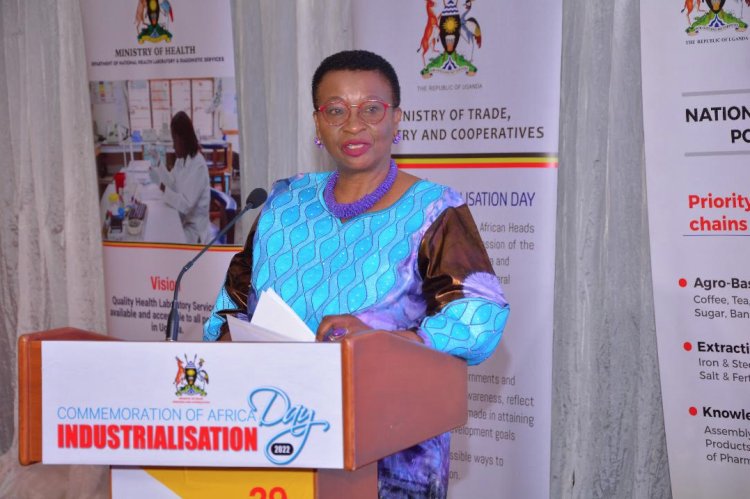Human capital development is an important factor of production which will enable Uganda compete in the Industrial sector

KAMPALA - The National Resistance Movement (NRM) Government has, since 1986, been pursuing deliberate measures to industrialize Uganda with considerable levels of success. The pursuit of this strategic direction has not been by accident but rather as a result of intensive analysis of the problems facing the country and Africa in general, as well as the opportunities that surround us. Our approach to industrialize Uganda has been steadfast and anchored on addressing the ten ‘Strategic Bottlenecks’. The bottlenecks include: ideological disorientation; under-development of human resources; under-developed infrastructure; continued export of raw materials, the under-developed agriculture and services sectors; nationalization of private sector assets (banks, utility companies, shops, farms, etc.); and suppression of democracy in the past.
The Government of Uganda has focused on addressing the above-mentioned bottlenecks, either internally or with our Regional Partners. As a result of these initiatives, we are moving steadily to integrate our markets using the East African Community (EAC), the Common Market for Eastern and Southern Africa (COMESA), and the African Continental Free Trade Area (AfCFTA). We are supporting efforts to connect our countries through joint and coordinated development of infrastructure such as roads, water, railway and ICT infrastructure, and commercialization of the Agricultural sector. Additionally, we are focused on placing the State at the fulcrum of Industrial Development, including developing the infrastructure necessary for industrial expansion. For example, the total paved roads as a percentage of total national roads has increased from 8% (1,000km) in 1986 to 21.1% (5,500km) in 2019. The electricity generation currently stands at 1252.4 Mega Watts, while transmission lines cover 2,989 km.
Further, Government is determined to reduce the cost of electricity for manufacturing industries to 5 cents USD (Ugx 185) per unit from the current 8.7 cents USD (Ush 321) per unit. For ICT, the optical fiber network covers 2,424 kms.
We also recognize that significant strides in human development had been and continue to be critical for our industrial drive, having been made with the establishment of institutions in the area of skilling in addition to deliberate measures to, adequately remunerate our scientists. Indeed, human capital development is perhaps the most important factor of production, driving innovation which is a key driver to industrial development. Human beings can turn around anything provided they have the necessary skills and knowledge. However, according to the Global Innovation Index 2018, Uganda is ranked 103rd out of 126 countries.
In acknowledging this and the need to advance going forward, the National Industrial Policy 2020 focuses on strengthening skilled human recourses, increasing the development and use of research innovations, and adopting appropriate technologies to increase productivity and efficiency in the Industrial sector.
By addressing the ten strategic bottlenecks, the Government has set the stage fo industrialization. Consequently, the number of industrial establishments in the country has increased from 80 in 1986 to 4,920 in 2019 and over 1.3 million people are employed in the Industrial sector. The National Industrial Policy 202 has been developed to position the Country to take advantage of both domestic and external opportunities. Furthermore, the implementation of the policy will enable us to address critical human and societal needs including access to food, clothing, shelter, health, physical infrastructure, defense, mobility, and education, through employment opportunities and domestic production of value-added goods. It should enable us to curtail the hemorrhage that our economy has hither-to subjected itself by enabling us to process our agricultural products and manufacture from our mineral resources before we export.
The development of the National Industrial Policy 2020 has followed a comprehensive consultative process involving the Private Sector, Academia, and Development partners, among others. I, therefore expect effective participation of all stakeholders in the implementation of this policy, which is critical for the socio-economic transformation of our Country (President Yoweri Museveni’s foreword in the NATIONAL INDUSTRIAL POLICY(NIP) December 2020, A Framework for Uganda’s Industrialization, Employment and Wealth Creation), developed for the Ministry of Trade, Industry and Cooperatives.
Meanwhile, in her preamble of the National Industrial policy 2020, the former minister of Trade, industry and Cooperatives, Hon. Amelia Kyambadde said that the NIP will serve as a blueprint for Uganda’s Industrial transformation over the decade 2020-2030 and has identified priority commodity and mineral product value chains for development over the period of implementation.
It is from the above background that Hon. Hanifa Kawooya, State Minister for Health General Duties, emphasized that the ministry of health will continue achieving its vision of ensuring that Ugandans are healthy enough to participate in the industrialization of the country because business comes after life. She made the remarks while addressing stakeholders at the commemoration of the Africa Industrialization Day 2022 held in Kampala.
Meanwhile, the Permanent secretary Ministry of Trade, Industry and Cooperatives Geraldine Ssali reminded stakeholders that as we commemorate the Africa Industrialization Day 2022, lets ensure that Uganda best leverages industrialization for growth in an inclusive and sustainable manner. She added that the goal of her ministry is to exceed the 35% mark for countries aiming to achieve middle-income status.
Present at the celebrations held at Kampala Serena Hotel on 29th November 2022 were; Hon. Mwebesa Francis, Minister of Trade Industry and cooperatives, Hon. Kasule Lumumba, Minister General Duties, Hon. David Bahati, Minister of State for Trade, Industry and Cooperatives, and other high-level dignitaries from government Ministries, Departments, Agencies and other international and multilateral partners in the Industrialization sector.
Also, Kaddu Abbey one of the online participants urged the ministry to promote sports and entertainment because they are a source of employment and are commercial because the revenue is there hence the dire need for government to streamline the two sectors so that they can contribute greatly to the GDP of the country in long run.
The commemoration of Africa Industrialization Day 2022 had the theme; “The Role of Accreditation in promoting inclusive and sustainable Industrialization, health, environment, and trade”.
The Principal objective of the Africa Industrialization Day, 2022 is to raise awareness on Uganda’s Industrialization Agenda, and thus rejuvenate high level political commitment especially towards promotion of inclusive and sustainable local manufacturing.
Other specific objectives include; create awareness and highlight the role of accreditation in promoting industrial development. Provide status update to the relevant stakeholders on Uganda’s industrialization agenda.
Leverage the AID 2022 to sustain the political momentum towards effective implementation of the National Industrial policy 2020. Reinforce the prioritization of key industrial value chains that have the highest potential for import replacement, export promotion and massive job creation. As a podium to reinforce industry-trade nexus in the context of business opportunities ushered by the regional markets like EAC, COMESA and AfCFTA.

































































































